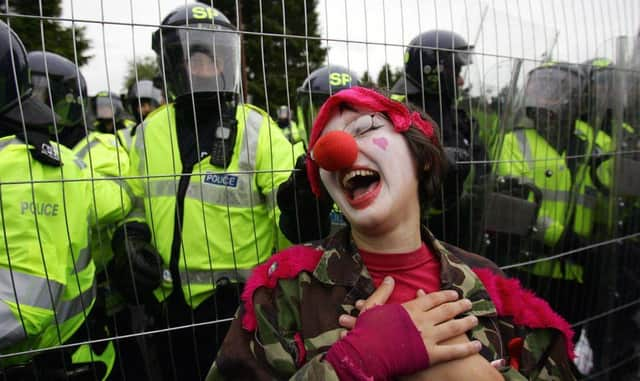Scots ministers feared 'hardcore' G8 protesters would bring havoc to Scotland


The security services were even called in to help contain the threat, according to the latest tranche of Scottish cabinet papers released today after fifteen years.
Scotland’s then First Minister Jack McConnell was so concerned about the powderkeg situation he had talks with organisers of Live8 events taking place UK-wide to co-incide with the summit at Gleneagles after reports that Sir Bob Geldof had issued a "call for chaos."
Advertisement
Hide AdAdvertisement
Hide AdThe summit of developed nations in July 2005 had a focus on the debt burden facing many African nations and galvanised hundreds of thousands of campaigners and activists who descended on Scotland for the event.
A meeting McConnell's top ministers the month beforehand was briefed about the prospect of widespread disorder, the cabinet papers reveal.
"The police and local authorities were worried about the potential consequences of a general invitation for people to come to Edinburgh," papers from a cabinet meeting on June 8 show.
"The real challenge is not just policing large scale, peaceful protests but containing any small, hardcore elements intent on disrupting events," a discussion of the cabinet remarked.
"It was understood that the security services were working to deal with this threat as best they could."
An estimated 200,000 campaigners marched through the heart of Edinburgh on July 2, the weekend before the summit on a Make Poverty History Walk. And Edinburgh hosted its own Live8 concert at Murrayfield, the last of many which took part across the UK, on July 6 to co-incide with the opening of the Gleneagles event. Although there were clashes between protesters and police, including groups who sought to access Gleneagles, the event largely passed off without the widespread rioting which had marked previous summits.
The prospect of trouble intensified after media reports suggested Bob Geldof, who was organising Live8, had issued a "call for chaos" although the cabinet papers also state he did not use these words.
It has now emerged that McConnell spoke with organisers of the events to "emphasise the importance of maintaining public support for their endeavours."
Advertisement
Hide AdAdvertisement
Hide AdThe major policing operation required 10,000 officers from Scotland and elsewhere in the UK at a cost of more than £70 million. But the internal struglle faced by Labour ministers in Scotland with party colleagues who were then in power at Westminster to come up with the additional costs for the global event is also made clear in the cabinet papers. No arrangement had been reached by early 2005 as planning for the event was well underway.
Meetings were set up between McConnell and then Chancellor Gordon Brown, as well as between Scotland's finance minister Tom McCabe and Treasury Secretary Paul Boateng, as concerns grew that Scotland may have had to foot the bill itself.
"In the absence of any indication from the Treasury that it will fund the substantial additional policing costs, the onus would be on the Executive and there would be a major impact on other services across Scotland," Cabinet papers from January 2005 state.
Mr Brown eventually stepped in two months later and agreed a "one-off payment" of £20 million to the then Executive to help meet the extra costs.
A message from the Editor:Thank you for reading this article. We're more reliant on your support than ever as the shift in consumer habits brought about by Coronavirus impacts our advertisers.
If you haven't already, please consider supporting our trusted, fact-checked journalism by taking out a digital subscription.
Comments
Want to join the conversation? Please or to comment on this article.